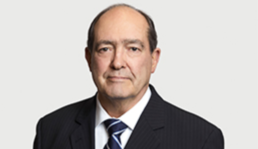These life stories may contain descriptions of childhood trauma and abuse, as well as images, voices and names of people now deceased. If you need help, you can find contact details for some relevant support services on our support page.
Australian Senator Andrew Murray (b. 1947) was in children’s homes as a child.
Born in Hove, England, Andrew was two when he was placed in a children’s home. At the age of four, Andrew was shipped to Fairbridge in Southern Rhodesia (now Zimbabwe) as a child migrant.
Murray began attending Rhodes University in South Africa in 1965. In 1968, he was elected as Deputy Vice President of the National Union of South African Students (NUSAS). He was supposed to become the next President of the peak body organisation, but was deported from South Africa for his activism. Murray was a Rhodes Scholar to Oxford University in 1971, and spent decades campaigning against apartheid.
We believed in democracy, we believed in the blacks having equal rights and the vote… That was terribly dangerous stuff in those days, so they threw me out and then made sure they watched me, followed me, opened my mail and generally made my life a little difficult.
Between 1969 and 1977 Murray served in the Rhodesian Air Force. He subsequently became a businessman, managing his own business as well as working at executive level in both private and public corporations.
Murray migrated to Australia with his family in 1989 and became a citizen in 1994. In 1996, he was elected as an Australian Democrats (AD) Federal Senator for Western Australia. Senator Murray was instrumental in bringing about significant federal government inquiries into the treatment of children in Australian institutions and foster care.
In 2000, Senator Murray gained support from the Australian Democrats and the Australian Labor Party (ALP) to initiate an inquiry into child migration, leading to the 2001 report, ‘Lost Innocents: Righting the Record’.
Senator Murray continued to lobby for further inquiries into the harm done to children placed in care. In 2003, Senator Murray launched an inquiry into institutional care for children, again with AD and ALP support. This inquiry resulted in the 2004 Senate report, ‘The Forgotten Australians’, which identified a history of cruelty, neglect, abandonment and exploitation towards approximately 500,000 Australian children and child migrants. A second inquiry on institutional and out-of-home care lead to the 2005 Senate report, ‘Protecting vulnerable children: A national challenge’.
Senator Murray has also served as a Member and Patron of out-of-home care advocacy organisations. He joined the Care Leavers Australasia Network (CLAN) in 2001. In 2007, Senator Murray was involved in the launch of the Alliance for Forgotten Australians (AFA), established “to work as an umbrella body for existing support and advocacy services”. The purpose of AFA is to implement recommendations from the ‘Forgotten Australians’ report, some of which have been achieved. The recommendations include a national redress scheme, an oral history, nationwide services including counselling and drop-in facilities, and recognition of Forgotten Australians as a special needs group.
Murray engaged in extensive campaigning, strategy, and advice to the Rudd government on all aspects of the National Apology to the Stolen Generations delivered on February 13, 2008. After twelve years as Senator, Murray decided not to seek election in the 2007 Federal Election. He retired from the Senate on 30 June 2008.
Outside of politics, Murray has authored reports and conference papers advocating for Forgotten Australians. His keynote speech at The Fourth International Conference on the History of Records and Archives is titled ‘The Forgotten Australians: Identity, records and their search for the past.’
Care-leavers who have searched for identity get pot-luck; sympathy, help and access from some, the reverse from others. It depends on the church, charity, agency or department, or even just on the individual they meet… While some progress has undoubtedly been made since the inquiry, overcoming privacy restrictions remains a significant hurdle for care leavers. Only legislative and administrative reform can address this.
Between 2013 and 2017, Murray served was as one of six Commissioners to the Royal Commission into Institutional Responses to Child Sexual Abuse. After being appointed as Commissioner, he resigned as Patron of CLAN and AFA to avoid the perception of a conflict of interest. Now retired, Murray still engages in some public tasks.
References:
“Former Senator Andrew Murray.” Parliament of Australia. https://www.aph.gov.au/Senators_and_Members/Parliamentarian?MPID=3M6
“Forgotten Australians.” Families Australia, ND. https://familiesaustralia.org.au/forgotten-australians/
Aedy, Richard. “Forgotten Australians special.” Life Matters, ABC Radio National, 16 November 2009. https://www.abc.net.au/radionational/programs/lifematters/forgotten-australians-special/3085908
Alliance for Forgotten Australians, ND. https://forgottenaustralians.org.au/#about
McKew, Maxine. “Govt unaccountable, says Murray”. ABC 6 July 2006. https://www.abc.net.au/lateline/govt-unaccountable-says-murray/1795180
Murray, Andrew. “The Forgotten Australians: Identity, records and their search for the past.” The New Critic, 8 (September 2008): pp 1-15. https://www.ias.uwa.edu.au/new-critic/eight/murray
Murray, Andrew. Personal Correspondence, 22 July 2022.
Royal Commission into Institutional Responses to Child Sexual Abuse (2012-2017). https://www.childabuseroyalcommission.gov.au/
Image available here.
